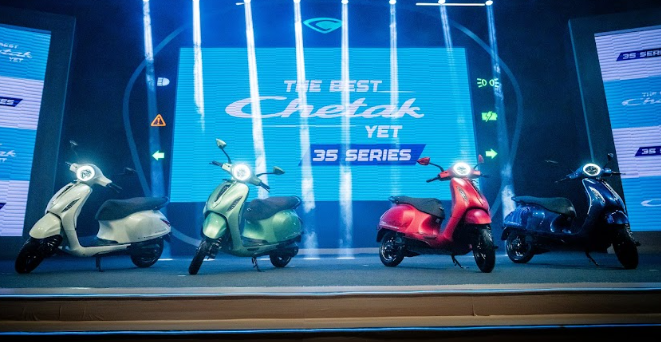
Pune: When Bajaj Auto started its EV journey in 2019-20, the business proposition wasn’t a profitable one in the emerging industry segment. It lost money on every vehicle sold, and therefore it didn’t pay to go for any aggressive targets. “Now that pressure is off”, says Rakesh Sharma, ED, Bajaj Auto, as the emerging business has entered the profit lane this year. Bajaj Auto bets on the just launched 35 series, with two variants, and another to follow soon, to lead the new business in sustainable profitability.With the EV business generating profits, and the new set of products, Bajaj Auto has set an ambitious target by tapping the opportunity that the global electrification megatrend offers. “It’s a great opportunity, and our goal is leadership in India, all the emerging markets,” says Sharma, in a roundtable discussion with journalists soon after launching the Chetak 35 series. He also stresses that on “leadership with a certain margin”, and not for only a few weeks or months.
Bajaj Auto is currently the leader in the domestic electric two-wheeler market, for the first time, but this distinction is only nineteen days old, starting December 1. According to Vahan registration data, 12,651 units of Chetak have been sold during this period, earning the brand a 26.6% market share. TVS Motor is in second spot, with 10,489 units and 22% market share, with Ola Electric following with sales of 9,151 units, or a 19.2% market share.
With the two-wheeler EV market clocking a growth rate of around 38%, or nearly double that of the growth rate for ICE two-wheelers, albeit on a smaller base, Sharma is bullish about prospects of electric two-wheelers in India. With subsidies gradually waning, he’s also prepared to see a slowdown in the EV industry. However, he’s bullish that electric is the eventual future for the industry.
However, he is also concerned about substandard products, and some malpractices in the industry that also pose a risk to hamper the EV ride. For example, the practice of tweaking the software to enhance speed of low speed EVs (max speed of 25kmph) which do not come under the ambit of CMVR (Central Motor Vehicles Rules). “This is happening, so we are writing to the government. This is what we must stop,” says Sharma.
The Indian electric two-wheeler industry has crossed the one million mark in unit sales this year, for the first time. Players in the emerging industry of an evolving technology are also witnessing some technical incidents sporadically, and they are being investigated and addressed at the earliest in order to also ensure the consumer’s peace of mind, and trust in BEVs (battery electric vehicles).
Strategy for a “marathon”
In its first year of existence, Bajaj Auto sold 7,000 units of the Chetak. To put it in perspective, the figure is one-third of the OEM’s monthly sales of the EV currently. From seventh position, and a 2.3% market share in April ‘22, Bajaj Auto has reached a market leading position of 26.7% currently. Some downward price revision also helped the EV gain more traction. The OEM has sold over 300,000 Chetaks so far.
At the fundamental level, an approach like that of a long distance runner for a marathon may be yielding gains. “This is a marathon. We don’t want to be right in front, because it takes time to build positions. If you’re too fast you may be huffing and puffing by the time the industry matures. Also, I don’t want to be the last, because then it’s difficult to catch up. We want to be in the middle, and then we will start to move forward,” says Sharma.
With over INR 300 crore invested in the EV business over the past three years, Bajaj Auto now plans to expand its EV portfolio regularly. Over the next year or so, it may have up to seven or eight offerings under the umbrella brand of Chetak. Discussions are on for entering the electric motorcycle space too, but Sharma says the OEM is yet to finalise the market point of entry.
Crossing the century mark
As it gains significant traction in the emerging domestic EV market, Bajaj Auto is also preparing for internationalising the new business starting next financial year. “There are a dozen markets we are targeting in different continents,” says Sharma. The international network for Bajaj Auto’s traditional business of ICE two- and three-wheelers, which Sharma was also instrumental in building, could be more than handy for the Chetaks, and future EVs to ride on.
Bajaj Auto has crossed the 100 mark in terms of nations it sells its products in. 102 is the current count, with Yeman being the latest market for the Pune headquartered major. The ASEAN markets will particularly be of interest as they also have a significant appetite for scooters.
With an increasing bet on EVs, on a firming up business ground, the 79 year old Bajaj Auto looks to script a new-age success story in the new industry. Given the current disruptive and technology-intensive era, this one could be more challenging to build. Achieving success in it will perhaps be more fulfilling too.

















